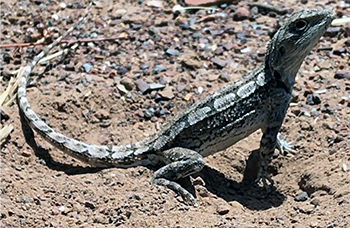
Sex is a complicated affair for Australia’s Jacky Dragon lizard.
When an embryo is developing, one of the most important events is when it becomes either male or female, which occurs during a process known as sex determination, followed by the development of ovaries or testes.
As humans, we are used to thinking of this process as controlled by sex chromosomes – two X chromosomes make a female and a single X and Y chromosome makes a male.
However, in many reptiles, sex determination can be influenced by the environment in which the egg is incubated. When temperature is the deciding factor, it is called temperature dependent sex determination, and occurs when a species lacks sex chromosomes.
While the Jacky Dragon has temperature dependent sex determination, new research in the Proceedings of the Royal Society B, suggests things may not be as simple as they seem. The Jacky Dragon has hidden developmental secrets, scientists say.
“We have been studying the Jacky Dragon for many years, but this is the first study to look directly at how temperature influences sexual development in embryos,” says Associate Professor, Dr Lisa Schwanz, at the Evolution and Ecology Research Centre UNSW.
By analysing the process of sex determination in Jacky Dragon embryos for the first time, researchers discovered that it has hallmarks of an interaction between sex chromosomes and the environment to determine sex of the offspring, not previously known in the species.
Previous research from the team in a close relative of the Jacky Dragon, the Bearded Dragon, established this developmental hallmark is associated with sex reversal.
The Bearded Dragon has sex chromosomes, so normally an embryo’s sex is determined genetically. But if eggs are incubated at high temperatures, genetic males reverse their sex and instead develop as sex reversed females.
During this process, the developing embryo goes through a period where its gonads are neither female ovaries or male testes, and instead are a mixture of both. This type of gonad is known as an ovotestes.
So far, sex reversal is only known to occur in the Bearded Dragon, and one other Australian lizard species.
When looking at the developing embryos of Jacky Dragons at different incubation temperatures, the team found that ovotestes occurred at temperatures that produce biased sex ratios. This suggests that like its relative, the Bearded Dragon, the Jacky Dragon may also have sex reversal.
Co-author Flinders University Associate Professor in Evolutionary Biology Vera Weisbecker adds “the evolution of lizard sex is much more interesting than that of mammals, who all have the same type of genetic sex determination”.
“Ovotestes were considered a very rare trait in reptiles, until we found them in high numbers in sex-reversing bearded dragons. Finding them also in the Jacky Dragon was therefore really exciting,” Associate Professor Weisbecker says.
“It was a surprise to find ovotestes, an admixture of ovary and testes, in this species at extreme incubation temperatures. This means that sex determination in the Jacky dragon is much more complicated than we thought,” says lead author Sarah Whiteley, a PhD candidate at the University of Canberra.
“We hope that this unexpected result provides momentum to better understand sex determination in the Jacky Dragon, and in other reptile species as well,” CSIRO senior research scientist Dr Clare Holleley says.
This research highlights how little we understand about sex determination in reptiles. The team is planning future research to undercover the genetics underlying sex, and how it interacts with temperature in the Jacky Dragon. With a warming climate, it is becoming increasingly important to understand how temperature can influence traits as fundamental as an animal’s sex.
The Proceedings of the Royal Society B research article ‘Ovotestes suggest cryptic genetic influence in a reptile model for temperature-dependent sex determination‘ (2021) by SL Whiteley, A Georges, V Weisbecker, LE Schwanz and CE Holleley DOI: 10.1098/rspb.2020.2819

